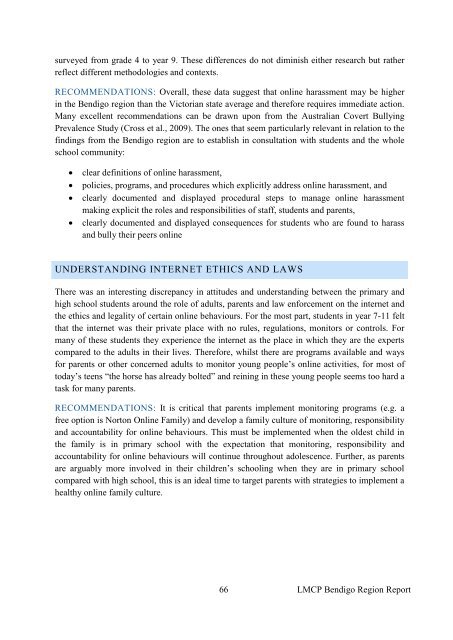LODDON MALLEE - Cyber Safe Kids
LODDON MALLEE - Cyber Safe Kids
LODDON MALLEE - Cyber Safe Kids
You also want an ePaper? Increase the reach of your titles
YUMPU automatically turns print PDFs into web optimized ePapers that Google loves.
surveyed from grade 4 to year 9. These differences do not diminish either research but rather<br />
reflect different methodologies and contexts.<br />
RECOMMENDATIONS: Overall, these data suggest that online harassment may be higher<br />
in the Bendigo region than the Victorian state average and therefore requires immediate action.<br />
Many excellent recommendations can be drawn upon from the Australian Covert Bullying<br />
Prevalence Study (Cross et al., 2009). The ones that seem particularly relevant in relation to the<br />
findings from the Bendigo region are to establish in consultation with students and the whole<br />
school community:<br />
clear definitions of online harassment,<br />
policies, programs, and procedures which explicitly address online harassment, and<br />
clearly documented and displayed procedural steps to manage online harassment<br />
making explicit the roles and responsibilities of staff, students and parents,<br />
clearly documented and displayed consequences for students who are found to harass<br />
and bully their peers online<br />
UNDERSTANDING INTERNET ETHICS AND LAWS<br />
There was an interesting discrepancy in attitudes and understanding between the primary and<br />
high school students around the role of adults, parents and law enforcement on the internet and<br />
the ethics and legality of certain online behaviours. For the most part, students in year 7-11 felt<br />
that the internet was their private place with no rules, regulations, monitors or controls. For<br />
many of these students they experience the internet as the place in which they are the experts<br />
compared to the adults in their lives. Therefore, whilst there are programs available and ways<br />
for parents or other concerned adults to monitor young people‟s online activities, for most of<br />
today‟s teens “the horse has already bolted” and reining in these young people seems too hard a<br />
task for many parents.<br />
RECOMMENDATIONS: It is critical that parents implement monitoring programs (e.g. a<br />
free option is Norton Online Family) and develop a family culture of monitoring, responsibility<br />
and accountability for online behaviours. This must be implemented when the oldest child in<br />
the family is in primary school with the expectation that monitoring, responsibility and<br />
accountability for online behaviours will continue throughout adolescence. Further, as parents<br />
are arguably more involved in their children‟s schooling when they are in primary school<br />
compared with high school, this is an ideal time to target parents with strategies to implement a<br />
healthy online family culture.<br />
66 LMCP Bendigo Region Report


